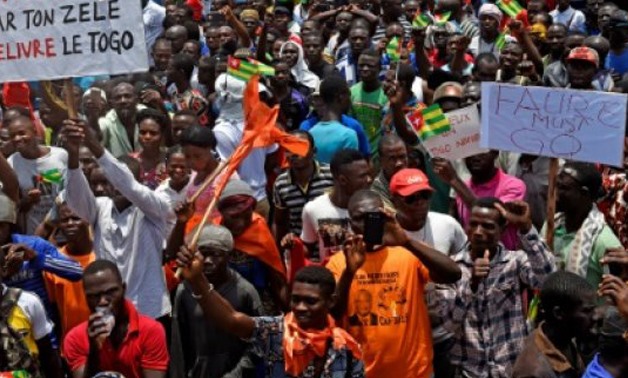
AFP / by Sophie BOUILLON | A rally in Lome drew at least 100,000 people in a country with a population of seven million, according to Amnesty International estimates
LOME – 7September 2017: Hundreds of thousands of opposition supporters protested across the west African state of Togo on Wednesday to demand constitutional reform.
Amnesty International country head Aime Adi told AFP "at least 100,000" were in the capital, Lome, and similar demonstrations took place in the cities of Sokode, Dapaong and Kara and half a dozen other locations.
Opposition party leader Jean-Pierre Fabre called the demonstration "unprecedented" and estimated that "more than one million people" were on the streets of Lome.
Neither figure was independently verified but AFP journalists on the ground said a tide of people, many of them angry, had converged on the coastal capital, dwarfing previous protests. The population of Togo is seven million.
Many brandished placards denouncing the regime of President Faure Gnassingbe, whose family has been in power for the last 50 years.
The protests have been called by a coalition of opposition parties, who vow to continue the protest on Thursday.
Gnassingbe chaired a cabinet meeting on Tuesday evening which saw ministers approve plans for a bill about restrictions on terms in office and changes to the voting system.
The opposition has been calling for both since 2005, when Gnassingbe succeeded his father, Gnassingbe Eyadema, who ruled for nearly four decades.
Civil service minister Gilbert Bawara told AFP that the government had taken note of the public's "strong expectation" and that a committee was looking into the proposals.
He invited opposition figures to enter into "dialogue and debate" on the issue.
But he said calls to limit the presidential mandate to a maximum of two five-year terms would not be implemented retroactively.
"There is no legislative reason to do so. But we need a consensus so the reform is accepted," he added.
A consensus would mean the approval of four-fifths of parliament, Bawara said.
Parliament does not return from its summer break until October, and exact details of the proposals are vague.
- Anger -
Opposition leaders warned against any delaying tactics or attempts to throw up a smokescreen.
Fabre was greeted with huge applause at the Be Gakpoto intersection, the focal point of riots that broke out in 2005 when Gnassingbe, just 38 at the time, succeeded his father.
"You can stop talking about constitution, you can stop talking about a draft law, it's too late for that, " Fabre said. "Today the door is open. If they don't come out of the house, it will be the people tomorrow who will be going in."
"Unir (Unite, the president's ruling party) calls for talks as soon as it is cornered," said Tikpi Atchadam, the head of the Panafrican National Party.
"I think the people have made up their mind because they're fed up," he added, calling on Gnassingbe to "leave by the front door".
"I don't believe in dialogue with the regime anymore," he said.
One protester, Armand Jarre, 26, said: "The reforms are lies, we don't believe them. If the people's minds are made up, nothing can stop them, not even the army."
One man taking part in the protests said on condition of anonymity that after 50 years ruled by the same family, Togo's problems were "too deep".
Hundreds of people were killed in 2005 during violent protests after Gnassingbe Eyadema's death and his son's succession. Gnassingbe was re-elected in 2010 and 2015, though the opposition rejected the results.
On August 19, at least two people were killed in protests in Sokode, some 300 kilometres (185 miles) north of the capital.


Comments
Leave a Comment